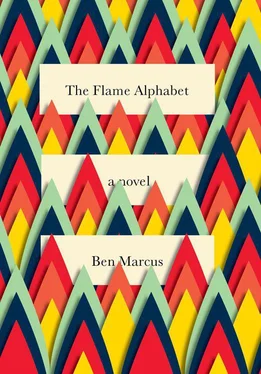Elsewhere stood those who had dressed for the weather, as if waiting for the train to take them to work. Perhaps for them such defenses were futile, too much bother, an assault on their pride. They were born to language, to speak and to listen and to share what they felt and thought. If such activities would kill them, then so be it. They’d not debase themselves by wearing equipment that didn’t even work.
These people, whose worlds had been suddenly sealed up by a sickness from language, who had been forced to cease all communication with their loved ones, their friends, strangers, and who now stood patiently outside hoping some answer was being devised in here: What might they say to each other if they were suddenly given a language that worked again?
At my desk each day I chased the notion that the alphabet as we knew it was too complex, soaked in meaning, stimulating the brain to produce a chemical that was obviously fatal. In its parts, in combination, our lettering system triggered a nasty reaction. If the alphabet could be thinned out, shaved down, to trick the brain somehow, perhaps we could still deploy this new set of symbols, or even a single symbol, the kind you hold in your hand and reshape for different meanings, for modest, emergency-only communications.
I decided to go all the way back to the first scripts. I had to rule out cuneiform, hieroglyphs, wedge writing. From the Egyptian I had to exclude the hieratic and demotic writings. It was impossible to be thorough, so I took shortcuts. Of the cuneiform I surveyed and dismissed were the Hurrian, Urartian, the Sumerian.
Each of these I re-created with meticulous examples and each of these was retrieved from my office by a technician, who came to my research floor in the afternoons with his medical bag to collect whatever specimens I had, all of which I created under cover from myself, in working conditions I thought of as controlled ignorance .
From my office the specimens were brought downstairs and readied for testing against people, people already shattered and near death, overexposed to the very thing I made more of every day.
And so my work began, ruling out approaches, touring through the history of letters and alphabets, borrowing liberally from incompatible scripts, inventing new ones, correcting mistakes burned into the old ones.
What the Pollard script could not do, neither could the script of Fraser. When I blended them it was worse, and when I crammed in the lettering from elsewhere—as with the Bamum script and the script from Alaska, whose characters I sought to flatten, because a central bone could be amputated from these scripts and they would collapse into rumpled shapes—the mixture was likewise noxious.
Did the language itself matter? Was ours exhausted and did an ancient one need to be revived, or were we bound to invent a new one, avoiding the perils of every language that has heretofore existed, I wondered.
Or was it the way that language was rendered, drawn, projected, seen . Had we tried everything possible in this realm? Was the delivery system the problem?
To test this I created white text on white paper, gray on gray, froze water into text-like shapes and allowed it to melt on select surfaces—slate, wood, felt—which it scarred so gently, you’d need a magnifying glass to spot the writing.
I tried pointillizing type, whitening or darkening it, making a scattered dust of it on the page, then blowing that dust free with a bellows until it could only be read under blue light. I tried copying it on the machine until the duplication rendered it ghosted and pale. The usual distortions, obvious, of course, and all failures.
If we hid the text too much, it could not be seen. If we revealed it so it could be seen, it burned out the mind. No matter what. To see writing was to suffer.
Strictly to rule out surface as a factor, I wrote on clay, I squeezed water onto wood using a dropper. Onto foam I poured channels of fluid, then hardened that foam with hot air. The paper I used was baked, bleached, soaked in lye. I ordered paper made not just from cotton and linen, but wool, the wool shorn from whatever was still out there, the world I was now protected from inside Forsythe.
From my window I saw no animals. I had a pair of binoculars, and when I was tired of the detached work of language creation I zoomed in on the hills of Rochester, hoping to see something.
Oh, I saw nature during this surveillance, obscene degrees of it. The binoculars magnified the catastrophe. I saw indecent splurges of beauty as summer tore open huge holes in the earth, from which came forth a sickening march of every kind of plant, as if the suddenly stifled world of people left more room for nature to fill, which it fucking well was going to do.
A paper of silver was produced for me, upon which letters were raised only through application of a light wand. A birch paper dipped in copper appeared in my materials box. Across its face I rubbed some salt. I scripted with salt on black felt, sprinkled salt over a twisting wooden model of block text, mounted on a wire like a nursery mobile, upon which the salt pooled in hills, creating the ephemeral shape of letters.
With stones I rubbed text away from paper, with sticks and clay bark and pastel markers I tested how much I could cover text without fully hiding it, and whether the covering mattered, being sure our test subjects would be shown plain blocks of color alongside shades that hid writing beneath.
I shaped letters with yarn, hieroglyphs with yarn, arranged yarn in the minimal spatter of contemporary shorthand. With a tweezers I laid down a vertical script of yarn, hung yarn from wire so it draped just so, and with jets of air blew the yarn into letter shapes as it swayed. Or so I surmised, for I did not look at the device myself. With yarn I wrote full sentences in the Coptic alphabet, the Indus script, Linear A and B, all proven toxic already, all capable, in blocks and paragraphs, to generate sickness—micro coma, paralysis—in the reader, but then I tugged each end of the yarn on these sentences until the words pulled long. I tugged on the yarn and documented each stage until the yarn was pulled so taut, it stood out in a straight line and could never be mistaken for language.
The results you already know. We took this work to our subjects, then stood to watch from the observation deck. If it was indoor work, the work of reading, we assembled the material in sealed-off rooms, into which a subject was brought, shown a chair, left alone.
The materials were bound, sealed in foil.
To be thorough, we tested on men and women alike, young and old, sick and well. There was a healthy supply of subjects on hand. People lined up for this work. They volunteered, fought to be first, scratched at each other without mercy, as if they’d been profoundly misled about what waited for them inside Forsythe.
Which of course, well, they had.
From my window I saw them, and from the observation booth I saw them, and sometimes I didn’t need to see them at all. I could stay at my desk and picture the sad readers being led into the testing area, strapped to the medical monitors. I could picture exactly how they would react. The work was foregone. To see it, to confirm it, was only a waste of time. I would know if something actually worked. The news would come fast. Or perhaps, if I ever did develop a script that could be read without sickness, restoring language to our fine species, I wouldn’t be so quick to share it with the good people of Forsythe.
Perhaps such an invention, kept private, was just what I needed to find my leverage.
At Forsythe one worked, one ate, one rested, and on occasion one consensually fucked a stranger, an arrangement that produced merely a pinhole of joy. Beyond that entertainment was limited, at least for my class of researchers, since our appetites were highly regulated. We were under shield. Our health was a priority.
Читать дальше











